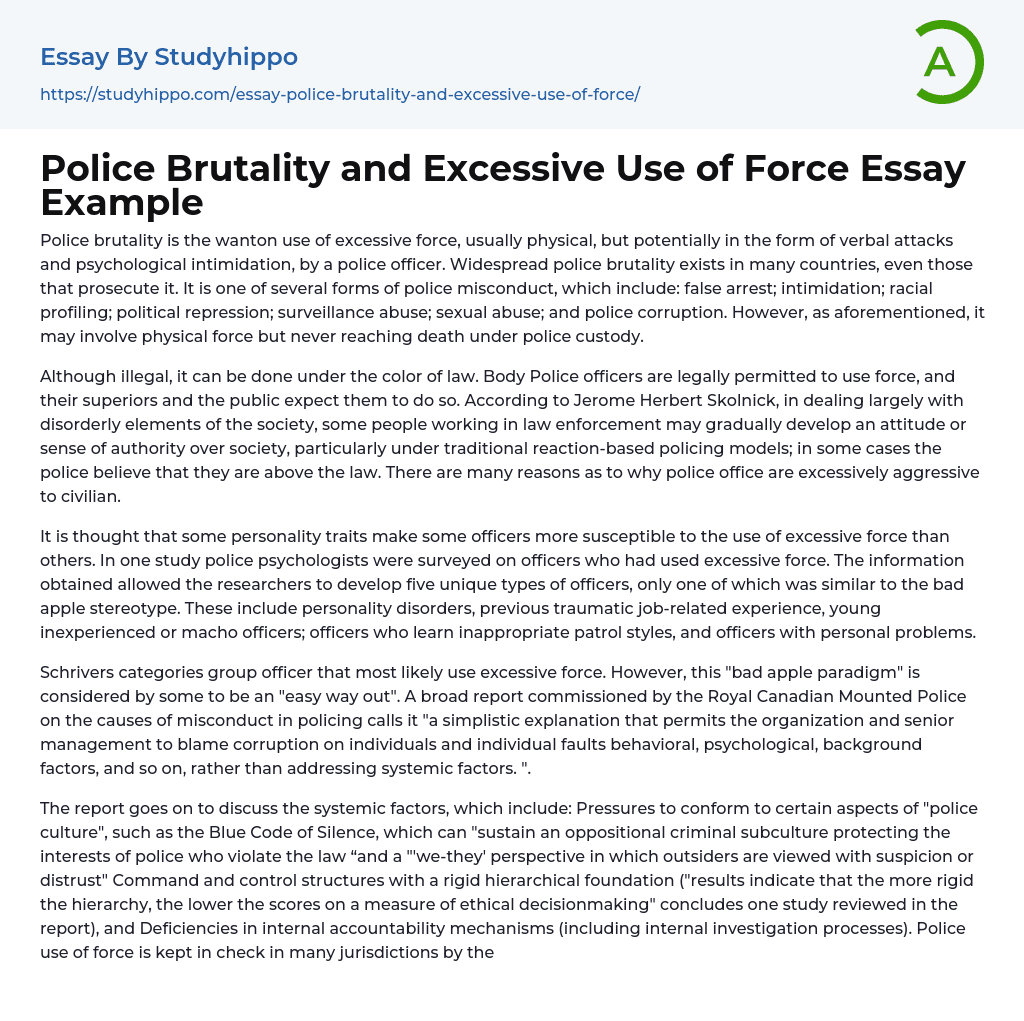

Police Brutality and Excessive Use of Force Essay Example
Police brutality, including physical, verbal, and psychological forms of attack and intimidation by police officers, is a prevalent issue in many countries despite laws against it. This misconduct encompasses false arrest, racial profiling, political repression, surveillance abuse, sexual abuse, and corruption. However, it is important to mention that although physical force may be used, it does not lead to death while an individual is in police custody.
Despite it being illegal, police officers are authorized to use force based on their legal authority. Both their superiors and the public expect them to utilize this force. According to Jerome Herbert Skolnick, in policing models where law enforcement primarily deals with unruly individuals in society, certain personnel may develop a sense of authority over society. This is particularly true in traditional reaction-based policing models. In certain cas
...es, the police may even see themselves as above the law. Multiple factors contribute to why police officers demonstrate excessive aggression towards civilians.
According to research conducted by police psychologists, certain personality traits can contribute to some officers being more prone to using excessive force. The study identified five distinct types of officers, one of which aligns with the commonly held stereotype of a "bad apple." These types include officers with personality disorders, those with past traumatic job-related experiences, young and inexperienced or overly confident officers, officers who adopt inappropriate patrol styles, and officers dealing with personal problems.
Schrivers categories group officers who are most likely to use excessive force. However, some consider this concept of a "bad apple paradigm" to be an "easy way out". A comprehensive report commissioned by the Royal Canadian Mounted Police on th
causes of misconduct in policing describes it as "a simplistic explanation that allows the organization and senior management to attribute corruption to individuals and their behavioral, psychological, and background faults, rather than addressing systemic factors."
The report examines the contributing factors to systemic problems in policing, including conforming to aspects of "police culture" like the Blue Code of Silence and distrust towards outsiders. It emphasizes the impact of command and control structures with a rigid hierarchy, as well as deficiencies in internal accountability mechanisms. To regulate force, many jurisdictions have implemented a use of force continuum that outlines appropriate levels based on behavior. This power is granted by civil government and constrained by statutory and common law. However, it's crucial to recognize that even when force is lawful, it can still be excessive, especially during instances of political repression.
Police brutality, which is the use of violence by the police to achieve political goals, contradicts societal values and cultural norms that advocate against any use of violence unless it is justified. Regrettably, this form of misconduct has become frequent in our everyday lives. The issue at hand pertains to determining the acceptable extent of force and identifying situations where its use can be justified. Present-day law enforcement carries batons and guns as a means to employ force when necessary; nevertheless, accusations of brutality should not automatically imply guilt.
Society expects the police to proactively identify and prevent criminal activity. If necessary, they should apprehend and imprison those responsible. While official rules state that police should only use necessary force to apprehend suspects, there is an unwritten expectation to "teach them a lesson," resulting in
incidents of brutality. Law enforcement agencies nationwide are currently facing criticism for their excessive use of force and issues related to police brutality, which occur during violent encounters. Despite widespread fear of crime, juries often sympathize with the challenging and protective nature of police work, making it difficult to convict an officer.
- Abuse Support essays
- Child Abuse essays
- Alcohol Abuse essays
- Physical Abuse essays
- Sexual Abuse essays
- Substance Abuse essays
- A Policeman essays
- Abortion essays
- Abuse essays
- Animal Rights essays
- Animal Testing essays
- Assault essays
- Bullying essays
- Controversial Issue essays
- Crash essays
- Cyber Bullying essays
- Feminism essays
- Human Rights essays
- Immigration essays
- Inequality essays
- Poverty essays
- Prejudice essays
- Racism essays
- Torture essays
- Violence essays
- Agreement essays
- Business Law essays
- Common Law essays
- Community Policing essays
- Constitution essays
- Consumer Protection essays
- Contract essays
- Contract Law essays
- Copyright Infringement essays
- Court essays
- Crime essays
- Criminal Law essays
- Employment Law essays
- Family Law essays
- Injustice essays
- Judge essays
- Jury essays
- Justice essays
- Lawsuit essays
- Lawyer essays
- Marijuana Legalization essays
- Ownership essays
- Police essays
- Property essays
- Protection essays



